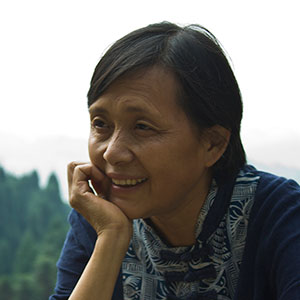“Ecological Politics for an Ecological Civilization”

Lecturer: Sheri Liao
Sheri Liao is an activist, journalist, and perhaps the most important environmentalist in China today.
Named a “Hero of the Environment” (TIME, 2009) and winner of the Clinton Global Citizen Award (2008), Liao is the founder and president of the non-government organization Global Village of Beijing. She served as an environmental adviser on the Beijing Organizing Committee for the 2008 Olympic Games. Through her role as president of Global Village of Beijing, she has produced models for green neighborhood complexes, rural communities, and organized many public awareness campaigns regarding pollution, recycling and reducing consumption.
Since the Szechuan earthquake, she has devoted herself to creating ecological villages in the devastated areas. She is working passionately against China’s move to depopulate the countryside and produce its food by industrial methods.
“The world might need more Ph.Ds, but what China really needs is an environmental group.”
– Sheri Liao
Postings from Seizing an Alternative
Suggested Reading List
Links to books and media by the speaker include:
- MOGULS & ENTREPRENEURS, SHERI LIAO
- SPEECH BY SOPHIE PRIZE WINNER MS. SHERI LIAO
- SHERI LIAO: “EXTREME ENVIRONMENTAL ACTIVIST”
- SHERI LIAO, GLOBAL VILLAGE BEIJING
More Information
John B. Cobb, Jr., intellectual architect of conference events, writes: “Apart from protest and legislation to slow or stop the slide into self-destruction, what is to be done? “There is widespread agreement that we must build from the ground up. Local communities at all levels can work toward the capacity to sustain themselves even when the larger structures on which they now depend collapse.
“The most radical vision, and hence the most realistic, is the development of ecological villages. This is most possible where traditional villages still exist. It may be that they can be transformed from dying remnants of an ancient way of life into the vanguard of a possible future. This is the vision of Sheri Liao, who has given herself unstintingly to the creation of ecological villages in the ruins left by the Szechuan earthquake. She will share with us both her vision and her experience. It is easy, in our armchairs, to imagine ecological villages that can survive and flourish even in the midst of global catastrophes. It is another matter to wrestle with the task of bringing such villages into existence.
“It is not often recognized in this country that our behavior is shaped by our beliefs. We have been taught that life and mind are irrelevant to the truly real material substance governed by the laws of mechanics. No one really believes that or lives fully as if it were so. But that model shapes the content of our education, and it underlies the recommendations of our experts. “This conference builds on the work of those who are most free from its domination. But this freedom needs to be grounded in a different vision, one that can be explicitly affirmed, explained, and enlarged. Liao finds much of what is needed in classical Chinese thought. In her work with Chinese peasants she can appeal to its continuing influence. She also recognizes in the philosophy of Alfred North Whitehead a valuable ally, one that has incorporated the vast range of information generated by modernity.”